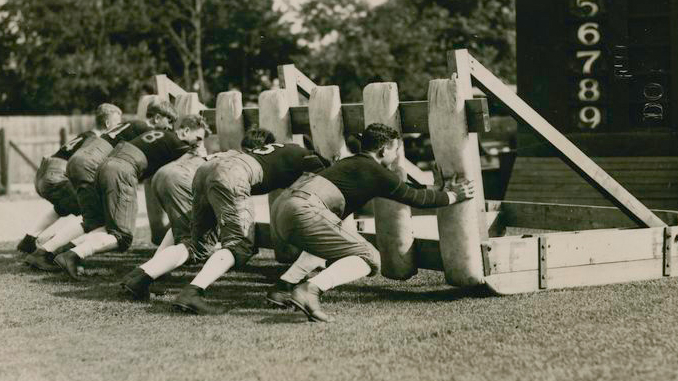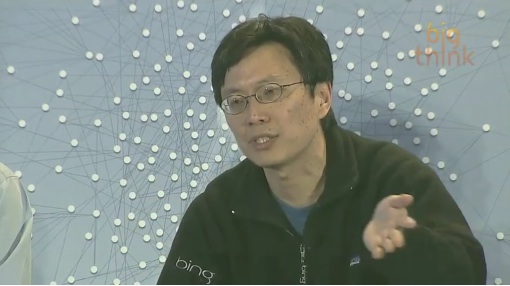bigthinkeditor

Opposition leader Mohamed ElBaradei says he has no doubt that the transition in Egypt will be accompanied by a transition in the entire Middle East, from Tunisia to Yemen.
The best predictor of a country’s future economic health is not the magnitude but the diversity of its production capacity, says M.I.T. economist César Hidalgo.
The Kentucky senator’s proposal would first roll back almost all federal spending to 2008 levels, then initiate reductions at various levels nearly across the board.
Over the last 30,000 years, the human brain has decreased about 10% in size. But our brains are not just getting smaller—they are also getting more efficient.
Over a long period of time, democratic and quasi-democratic nations change profoundly, but the change is gradual. Dictatorial regimes change in fits and starts, says Judge Richard Posner.
To beat procrastination, you need to increase your motivation to do each task on which you are tempted to procrastinate. Don’t try to eliminate procrastination—find a balance.
For 15 million years, a vast icebound lake has been sealed deep beneath Antarctica’s frozen crust, possibly hiding prehistoric or other unknown life. Now, the lake is about to be unsealed.
For some, a list of 1001 books you “must” read is no mere suggestion. Jeremy Dauber explains his addiction to lists and why he thinks they are a cultural boon.
Two new books argue that the good book isn’t the squeaky-clean endorsement of no-sex-until-marriage that conservatives say it is. Go forth and spread the good news.
What are the characteristics of a good courtship gift? Mating is predominantly facilitated by an extravagant gift which is costly to the male but intrinsically worthless to the female.
The Bureau of Labor Statistics announced the unemployment rate for January had fallen, but how could it decline so much if businesses added so few workers?
Contrary to the “cyberutopians,” who consider the Internet a powerful tool of political emancipation, the Internet more often than not constricts or even abolishes freedom.
Lately, the drive to fix the climate has taken the form of large-scale geoengineering projects designed to reverse the effects of global warming.
The fact that people are economically irrational shows us precisely why government safety-net programmes are necessary, says Mike Konczal at the Roosevelt Institute.
Sports, and most importantly talking about sports, is the only activity just about all Americans share regardless of age, education, or wealth. It is what unites Wall Street and Main Street.
Evidence is mounting that football is even more damaging to the brain than it is to the body—with links to Alzheimer’s disease and dementia.
With the site’s (admitted) connections to pharmaceutical and other companies, WebMD has become permeated with pseudomedicine and subtle misinformation.
Whether you’re a fan or not, the massive outpouring of grief this week in response to the news that minimalist rock band the White Stripes were to split up might seem puzzling.
Ever wished you could think more laterally to solve a problem? Zapping the brain with electricity helps people think outside the box to solve a task.
Is our psychological capacity the “one big thing” that could help us finally understand what it means to be human? Could it tell us something about how we find meaning in the universe?
Prime Minister David Cameron has launched a devastating attack on 30 years of multiculturalism in Britain, warning it is fostering extremist ideology and contributing to Islamic terrorism.
Think Twitter and other social media networks would cause people all over the world to start talking in the exact same way? In fact, the opposite may be true, say researchers.
Sunday, February 6, will be the centenary of his birth. Looking at the Ronald Reagan presidency from today, can we get any sense of how he rates in history?
Why do people play the lottery? On the one hand, the answer is obvious enough: We’re happy to spend $3 for approximately 15 seconds of irrational hope.
Burying trash—the usual way of disposing of the stuff—is old-fashioned and polluting. Atomizing trash eliminates the need to dump it, and generates useful power too.
We are all caught up in a crazy arms race to send our kids to prestigious colleges, where the order of the day (to borrow a useful term from the Cold War) is “escalation dominance.”
Does every type of cancer require its own individualized treatment, or might there be a universal cure? Scientists James Watson and Paul Davies suggest some new and unorthodox approaches to cancer treatment.
When should competitors work together? Only through greater transparency and sharing can Google and Bing collectively create a better Internet, says Microsoft’s Harry Shum.
CEO Whisperer Stephen Miles stresses the importance for execs to have social media strategies in place—especially during times of crisis. And this has broader implications for leaders at any level, since new forms of communication necessitate a two-way dialogue with the public.
I spent yesterday speaking to people in rural areas. Almost everyone was pro-Mubarak. You start to see some of the genius of the last two decades of information management.



